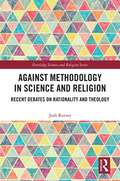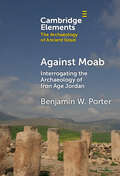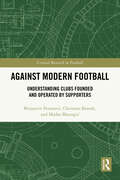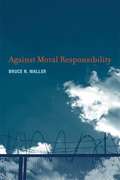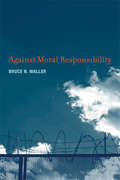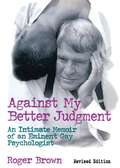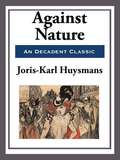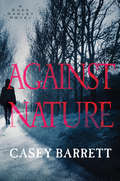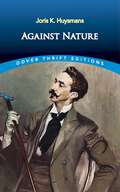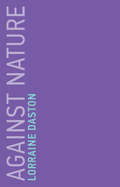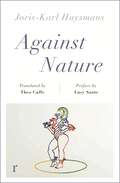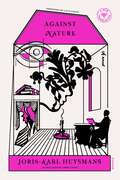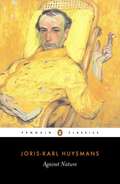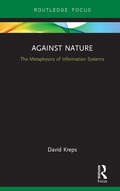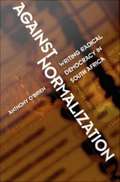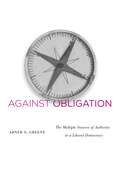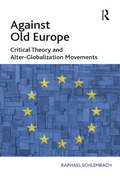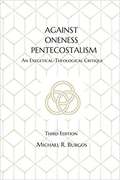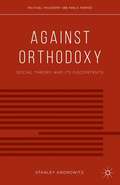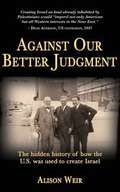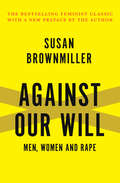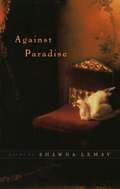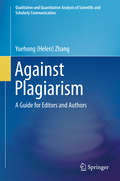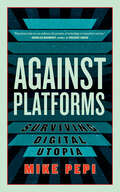- Table View
- List View
Against Methodology in Science and Religion: Recent Debates on Rationality and Theology (Routledge Science and Religion Series)
by Josh ReevesSince its development as a field over the last part of the twentieth century, scholars in science and religion have been heavily concerned with methodological issues. Following the lead of Thomas Kuhn, many scholars in this interdisciplinary field have offered proposals that purport to show how theology and science are compatible by appropriating theories of scientific methodology or rationality. Arguing against this strategy, this book shows why much of this methodological work is at odds with recent developments in the history and philosophy of science and should be reconsidered. Firstly, three influential methodological proposals are critiqued: Lakatosian research programs, Alister McGrath’s "Scientific Theology" and the Postfoundationalist project of Wentzel van Huyssteen. Each of these approaches is shown to have a common failing: the idea that science has an essential nature, with features that unite "scientific" or even "rational" inquiry across time or disciplines. After outlining the issues this failing could have on the viability of the field, the book concludes by arguing that there are several ways scholarship in science and religion can move forward, even if the terms "science" and "religion" do not refer to something universally valid or philosophically useful. This is a bold study of the methodology of science and religion that pushes both subjects to consider the other more carefully. As such, it will be of great interest to scholars in religious studies, theology and the philosophy of science.
Against Moab: Interrogating the Archaeology of Iron Age Jordan (Elements in The Archaeology of Ancient Israel)
by Benjamin W. PorterKnown as a place, a people, and a kingdom at various points in the second and first millennia BCE, Moab has long sustained the attention of archaeologists, philologists, and historians, in part because of its adjacent location to ancient Israel. The past 150 years of research in what is today west-central Jordan has proffered a significant corpus of evidence from the region's archaeological sites. However, a critical analysis of this evidence reveals significant gaps in knowledge that challenge attempts to narrate Moab's political, economic, and social history. This Element examines the evidence as well as the debates surrounding Moab's development and decline. This title is also available as open access on Cambridge Core.
Against Modern Football: Understanding Clubs Founded and Operated by Supporters (Critical Research in Football)
by Christian Brandt Benjamin Perasović Marko MustapićThis is the first book to offer in-depth analysis of the "Against Modern Football" movement through the comparison of two AMF clubs. The movement has emerged in opposition to the rampant commercialisation of football and the lack of supporters’ influence over the governance of the clubs they support. Drawing on long-term ethnographic research, the book examines the foundation, organisation and governance of new clubs set up by supporters as part of the AMF movement. Centred on detailed case studies of two clubs in particular—HFC Falke in Germany, founded in 2014, and Varteks Varaždin in Croatia, founded in 2011—the book explores supporter cultures and identity and considers the social processes at work in the foundation of new football clubs. By examining the unique local and national contexts in which HFC Falke and Varteks Varaždin have emerged, as well the broader international context that encompasses well-known AMF clubs such as FC United of Manchester, the book makes an important contribution to our understanding of supporters, their activism, the significance of football clubs, and social movements more broadly. This book is fascinating reading for anybody with an interest in football, the sociology of sport, sport management, the politics of sport, social movements, subcultures, or ethnography.
Against Moral Responsibility
by Bruce N. WallerIn Against Moral Responsibility, Bruce Waller launches a spirited attack on a system that is profoundly entrenched in our society and its institutions, deeply rooted in our emotions, and vigorously defended by philosophers from ancient times to the present. Waller argues that, despite the creative defenses of it by contemporary thinkers, moral responsibility cannot survive in our naturalistic-scientific system. The scientific understanding of human behavior and the causes that shape human character, he contends, leaves no room for moral responsibility. Waller argues that moral responsibility in all its forms--including criminal justice, distributive justice, and all claims of just deserts--is fundamentally unfair and harmful and that its abolition will be liberating and beneficial. What we really want--natural human free will, moral judgments, meaningful human relationships, creative abilities--would survive and flourish without moral responsibility. In the course of his argument, Waller examines the origins of the basic belief in moral responsibility, proposes a naturalistic understanding of free will, offers a detailed argument against moral responsibility and critiques arguments in favor of it, gives a general account of what a world without moral responsibility would look like, and examines the social and psychological aspects of abolishing moral responsibility. Waller not only mounts a vigorous, and philosophically rigorous, attack on the moral responsibility system, but also celebrates the benefits that would result from its total abolition.
Against Moral Responsibility
by Bruce N. WallerA vigorous attack on moral responsibility in all its forms argues that the abolition of moral responsibility will be liberating and beneficial.In Against Moral Responsibility, Bruce Waller launches a spirited attack on a system that is profoundly entrenched in our society and its institutions, deeply rooted in our emotions, and vigorously defended by philosophers from ancient times to the present. Waller argues that, despite the creative defenses of it by contemporary thinkers, moral responsibility cannot survive in our naturalistic-scientific system. The scientific understanding of human behavior and the causes that shape human character, he contends, leaves no room for moral responsibility.Waller argues that moral responsibility in all its forms—including criminal justice, distributive justice, and all claims of just deserts—is fundamentally unfair and harmful and that its abolition will be liberating and beneficial. What we really want—natural human free will, moral judgments, meaningful human relationships, creative abilities—would survive and flourish without moral responsibility. In the course of his argument, Waller examines the origins of the basic belief in moral responsibility, proposes a naturalistic understanding of free will, offers a detailed argument against moral responsibility and critiques arguments in favor of it, gives a general account of what a world without moral responsibility would look like, and examines the social and psychological aspects of abolishing moral responsibility. Waller not only mounts a vigorous, and philosophically rigorous, attack on the moral responsibility system, but also celebrates the benefits that would result from its total abolition.
Against My Better Judgment: An Intimate Memoir of an Eminent Gay Psychologist
by Roger BrownAgainst My Better Judgment: An Intimate Memoir of an Eminent Gay Psychologist is an extraordinary and moving account of the life of a gay man in his late 60s after he loses his companion of 40 years to cancer. A leading professor of psychology at Harvard University, Roger Brown bravely comes forth with his compelling story of grief, loneliness, and a relentless search for intimacy, healing, and self-acceptance. Readers gain insight into a stage of life experienced by gay men of which little is written or spoken due to the ageism that characterizes homosexual culture. Against My Better Judgment reveals deeply personal truths that will prepare gay men for what to expect in the later stages of life. Universal in nature, these truths will speak to readers from various lifestyles and of all ages. Readers will recognize the book as a story of looking for love in all the wrong places, but will also see in it a process of discovery--both internal and external. In the aftermath of his lover&’s death, Brown turns to prostitutes for companionship, for relieving repressed sexual energy, and even for love. Through his unique relationships with three young men, he does not find the romantic love he so desperately seeks, but discovers that his idea of human nature has been formed by his particular life position and association with people who share his values, knowledge, and privileges. Once he goes outside his social and intellectual circle, he acquires a new perspective on life and realizes how far from universal truth his notions of humanity have been.Readers of Against My Better Judgment will gain a different perspective on the complexities of love, relationships, fidelity, human nature, and the hardships of life inevitably faced by all humans--straight, gay, or bisexual. Gay men, lesbians, psychologists, widowers, therapists, and anthropologists, as well as sensitive readers of any background, will heighten their understanding of what it means to be human. This remarkable story makes a tremendous contribution to existing gay literature and the timeless struggle of art and literature to make sense of the universe and the place of humans within it. Echoing life, Against My Better Judgment, with its brutal honesty, intrigues and repels alternately, just as it elicits both sadness and laughter.
Against Nature
by Joris-Karl HuysmansAgainst Nature by Joris-Karl Huysmans is a novel in which very little happens; its narrative concentrates almost entirely on its principal character, and is mostly a catalogue of the tastes and inner life of Jean Des Esseintes, an eccentric, reclusive aesthete and antihero, who loathes 19th century bourgeois society and tries to retreat into an ideal artistic world of his own creation. Against Nature contains many themes which became associated with the Symbolist aesthetic. In doing so, it broke from naturalism and became the ultimate example of decadent literature. Jean Des Esseintes is the last member of a powerful and once proud noble family. He has lived an extremely decadent life in Paris which has left him disgusted with human society. Without telling anyone, he absconds to a house in the countryside. He fills the house with his eclectic art collection and decides to spend the rest of his life in intellectual and aesthetic contemplation. Throughout his intellectual experiments, he recalls various debauched events and love affairs of his past in Paris.
Against Nature (A Duck Darley Novel #2)
by Casey BarrettPerched in an airy penthouse above the corrupt streets of Manhattan, unlicensed P.I. Duck Darley has settled into an unlikely domestic routine with a wealthy divorcée and her precocious eight-year-old son. But old nightmares return when a desperate text from Cass Kimball, the former partner Duck once took a bullet to protect, lures him back into sworn-off vices and the sinister world of professional sports . . . Cass cries murder after her boyfriend tumbles to his death in the Catskills while researching the tragic doping experiments that changed the lives of East German Olympic athletes during the Cold War. Following the brutal killing of a champion javelin thrower, Cass herself is arrested on charges of double homicide, leaving Duck on an impossible quest for answers while doubting everything he ever believed about his secretive sidekick . . . Now, caught between the secret horrors of extreme performance enhancement and shadowy criminals who stalk him relentlessly, it’s sink or swim as Duck stumbles through a reckless investigation that endangers both his life and that of anyone he allows himself to hold dear.
Against Nature (Dover Thrift Editions)
by Joris K. HuysmansA classic account of the quest for enlarged experience and new sensations, this 1884 novel scandalized Victorian critics with its break from naturalism and embrace of fin-de-siècle decadence.
Against Nature (Untimely Meditations #17)
by Lorraine DastonA pithy work of philosophical aMassachusetts Institute of Technologynthropology that explores why humans find moral orders in natural orders.Why have human beings, in many different cultures and epochs, looked to nature as a source of norms for human behavior? From ancient India and ancient Greece, medieval France and Enlightenment America, up to the latest controversies over gay marriage and cloning, natural orders have been enlisted to illustrate and buttress moral orders. Revolutionaries and reactionaries alike have appealed to nature to shore up their causes. No amount of philosophical argument or political critique deters the persistent and pervasive temptation to conflate the “is” of natural orders with the “ought” of moral orders.In this short, pithy work of philosophical anthropology, Lorraine Daston asks why we continually seek moral orders in natural orders, despite so much good counsel to the contrary. She outlines three specific forms of natural order in the Western philosophical tradition—specific natures, local natures, and universal natural laws—and describes how each of these three natural orders has been used to define and oppose a distinctive form of the unnatural. She argues that each of these forms of the unnatural triggers equally distinctive emotions: horror, terror, and wonder. Daston proposes that human reason practiced in human bodies should command the attention of philosophers, who have traditionally yearned for a transcendent reason, valid for all species, all epochs, even all planets.
Against Nature (riverrun editions): a new translation of the compulsively readable cult classic
by Joris-Karl HuysmansThe cult novel of fin de siècle decadence that inspired Oscar Wilde'It will be biggest fiasco of the year - but I don't give a damn! It will be something nobody has ever done before.' The title page of the first complete English translation of Against Nature (published in the French as À Rebours) included the caption 'the book that Dorian Gray loved and inspired Oscar Wilde.' It was, declared Wilde, one of the best novels he had ever read. It is the story of Jean des Esseintes, the last of a proud and noble family, who retreats from the world in disgust at bourgeois society and leads a life based on cultivation of the senses through art. Des Esseintes distills perfumes from the rarest oils and essences, he creates a garden of poisonous flowers, sets gemstones in a tortoise's gold-painted shell and plans to corrupt a street urchin until he is degraded enough to commit murder. Des Esseintes' aesthetic pilgrimage is described in minutely documented realistic detail and was widely regarded as the guidebook of decadence. This influential novel is now available in a new translation by Theo Cuffe and includes a preface by Luc Sante.
Against Nature: A Novel
by Joris-Karl HuysmansJoris-Karl Huysmans’s cult classic of deviance and decadence that inspired Oscar Wilde’s Picture of Dorian Gray, now in a new translation by Theo CuffeA celebration of deviance, vanity, sensual abandon, and the aesthetics of artifice, Against Nature brings us the nineteenth-century rebel Jean Des Esseintes—disaffected, degenerate, and art obsessed. The last of a proud and noble family, Des Esseintes retreats from the world in disgust at bourgeois society and leads a life based on cultivation of the senses through art. He distills perfumes from the rarest oils and essences, creates a garden of poisonous flowers, sets gemstones in a tortoise’s gold-painted shell, and plans to corrupt a street urchin until he is degraded enough to commit murder. Des Esseintes’s groundbreaking aesthetic pilgrimage in Against Nature has served as the guidebook to decadence for more than a century, inspiring writers from Oscar Wilde to Michel Houellebecq.A pioneer whose early work took inspiration from Baudelaire and Zola, Joris-Karl Huysmans was a founder of the nineteenth-century decadent movement. Against Nature has influenced countless writers and artists and enjoys a cult following to this day. This new translation by Theo Cuffe, with a foreword by Lucy Sante, captures the magnificence of Huysmans’s famous style—filled with wit and irony, expressiveness and precision, erudition and sensuality.
Against Nature: A Rebours
by Joris-Karl HuysmansThe hero of this curious novel is des Esseintes, a neurasthenic aristocrat who has turned his back on the vulgarity of modern life and retreated to an isolated country villa. Here, accompanied only by a couple of silent servants, he pursues his obsessions with exotic flowers, rare gems, and complex perfumes and embarks on a series of increasingly strange aesthetic experiments, starting with the decision to give his giant pet tortoise a jewel-encrusted shell...
Against Nature: The Metaphysics of Information Systems
by David KrepsThis book questions the nature of the business and social information systems so ubiquitous in contemporary life. Linking positivism, individualism, and market-fundamentalist economics at the root of these systems, it critiques the philosophical ground of this triumvirate as fundamentally against nature. Connecting counter-philosophies of the subject as a natural part of existence, with more collectivist and ecological economics, it presents a historical critique of the development of the academic field of information systems and offers a complex view of the nature of Nature through which we might reshape our approach to technology and to our economies to overcome the existential threat of climate change. As such, it will appeal to philosophers, social theorists, and scholars of science and technology studies with interests in the environment and ecology, as well as those working in the field of information systems.
Against Normalization: Writing Radical Democracy in South Africa
by Anthony O'BrienAt the end of apartheid, under pressure from local and transnational capital and the hegemony of Western-style parliamentary democracy, South Africans felt called upon to normalize their conceptions of economics, politics, and culture in line with these Western models. In Against Normalization, however, Anthony O'Brien examines recent South African literature and theoretical debate which take a different line, resisting this neocolonial outcome, and investigating the role of culture in the formation of a more radically democratic society. O'Brien brings together an unusual array of contemporary South African writing: cultural theory and debate, worker poetry, black and white feminist writing, Black Consciousness drama, the letters of exiled writers, and postapartheid fiction and film. Paying subtle attention to well-known figures like Nadine Gordimer, Bessie Head, and Njabulo Ndebele, but also foregrounding less-studied writers like Ingrid de Kok, Nise Malange, Maishe Maponya, and the Zimbabwean Dambudzo Marechera, he reveals in their work the construction of a political aesthetic more radically democratic than the current normalization of nationalism, ballot-box democracy, and liberal humanism in culture could imagine. Juxtaposing his readings of these writers with the theoretical traditions of postcolonial thinkers about race, gender, and nation like Paul Gilroy, bell hooks, and Gayatri Spivak, and with others such as Samuel Beckett and Vaclav Havel, O'Brien adopts a uniquely comparatist and internationalist approach to understanding South African writing and its relationship to the cultural settlement after apartheid. With its appeal to specialists in South African fiction, poetry, history, and politics, to other Africanists, and to those in the fields of colonial, postcolonial, race, and gender studies, Against Normalization will make a significant intervention in the debates about cultural production in the postcolonial areas of global capitalism.
Against Obligation
by Abner S. GreeneDo citizens of a nation such as the United States have a moral duty to obey the law? Do officials, when interpreting the Constitution, have an obligation to follow what that text meant when ratified? To follow precedent? To follow what the Supreme Court today says the Constitution means? These are questions of political obligation (for citizens) and interpretive obligation (for anyone interpreting the Constitution, often officials). Abner Greene argues that such obligations do not exist. Although citizens should obey some laws entirely, and other laws in some instances, no one has put forth a successful argument that citizens should obey all laws all the time. Greene’s case is not only “against” obligation. It is also “for” an approach he calls “permeable sovereignty”: all of our norms are on equal footing with the state’s laws. Accordingly, the state should accommodate religious, philosophical, family, or tribal norms whenever possible. Greene shows that questions of interpretive obligation share many qualities with those of political obligation. In rejecting the view that constitutional interpreters must follow either prior or higher sources of constitutional meaning, Greene confronts and turns aside arguments similar to those offered for a moral duty of citizens to obey the law.
Against Old Europe: Critical Theory and Alter-Globalization Movements
by Raphael SchlembachIn the wake of the Iraq war, the term Old Europe was appropriated by politicians, civil society and social movement actors alike to rally in defence of supposedly social and civilized values against the perceived predatory forces of American finance. Against Old Europe sheds light on the social movement politics encapsulated in the protest slogan 'Fight Old Europe'. Within what is broadly labelled the global justice movement, it explores a particular, radical perspective that warns against the identification with European values by movements resisting neoliberalism. Exploring the work of key theorists critical of globalization, including Habermas, Negri, Holloway, Postone and de Benoist, the book examines critical theory approaches to alter-globalization, illustrated with concrete examples of movements within contemporary Europe. In so doing, it invites readers to explore the charges of nationalism, anti-Americanism and antisemitism brought against parts of the alter-globalization movement. Providing a new perspective on critiques of globalization, Against Old Europe will appeal to sociologists and social and political theorists studying social movements, anti-globalization activism and European politics and identity.
Against Oneness Pentecostalism: An Exegetical-Theological Critique
by Michael BurgosOneness Pentecostalism constitutes one of the world's largest non-trinitarian expressions of Christianity. While many studies have been written to provide a critique of other heterodox Christian groups (e.g., Jehovah's Witnesses, the LDS Church), there is a general lack of careful scholarship examining the theological claims of Oneness Pentecostals. <p><p> Now revised, updated, and expanded, Against Oneness Pentecostalism (3rd Edition) is a thoroughly researched critique of Oneness Pentecostalism. With scholarly precision, Michael Burgos has provided an incisive evaluation of Oneness exegesis and theology while accurately representing the teachings of Oneness Pentecostals.
Against Orthodoxy
by Stanley AronowitzIn Against Orthodoxy, the author engages some of the most provocative thinkers of the twentieth century, including Georg Lukacs, Antonio Gramsci, Herbert Marcuse, Karl Marx, Harry Braverman and Paulo Freire. All of these social and political theorists were dedicated to fundamental social change, but many were forced to recognize the difficulty of achieving change in the modern world. This book demonstrates that all of them reject conventional interpretations of how radical change mightbe possible. What marks their unity is an effort to address capitalism's ability to incorporate widespread popular alienation. Consequently they urge serious attention to issues of culture, subjectivity, and education.
Against Our Better Judgment: The Hidden History Of How The United States Was Used To Create Israel
by Alison WeirSoon after WWII, US statesman Dean Acheson warned that creating Israel on land already inhabited by Palestinians would "imperil" both American and all Western interests in the region. Despite warnings such as this one, President Truman supported establishing a Jewish state on land primarily inhabited by Muslims and Christians. Few Americans today are aware that US support enabled the creation of modern Israel. Even fewer know that US politicians pushed this policy over the forceful objections of top diplomatic and military experts. As this work demonstrates, these politicians were bombarded by a massive pro-Israel lobbying effort that ranged from well-funded and very public Zionist organizations to an "elitist secret society" whose members included Supreme Court Justice Louis Brandeis. Against Our Better Judgment brings together meticulously sourced evidence to illuminate a reality that differs starkly from the prevailing narrative. It provides a clear view of the history that is key to understanding one of the most critically important political issues of our day.
Against Our Will: Men, Women and Rape (Pelican Ser.)
by Susan BrownmillerSusan Brownmiller&’s groundbreaking bestseller uncovers the culture of violence against women with a devastating exploration of the history of rape—now with a new preface by the author exposing the undercurrents of rape still present todayRape, as author Susan Brownmiller proves in her startling and important book, is not about sex but about power, fear, and subjugation. For thousands of years, it has been viewed as an acceptable &“spoil of war,&” used as a weapon by invading armies to crush the will of the conquered. The act of rape against women has long been cloaked in lies and false justifications.It is ignored, tolerated, even encouraged by governments and military leaders, misunderstood by police and security organizations, freely employed by domineering husbands and lovers, downplayed by medical and legal professionals more inclined to &“blame the victim,&” and, perhaps most shockingly, accepted in supposedly civilized societies worldwide, including the United States.Against Our Will is a classic work that has been widely credited with changing prevailing attitudes about violence against women by awakening the public to the true and continuing tragedy of rape around the globe and throughout the ages.Selected by the New York Times Book Review as an Outstanding Book of the Year and included among the New York Public Library&’s Books of the Century, Against Our Will remains an essential work of sociological and historical importance.
Against Paradise
by Shawna LemayShawna Lemay’s rich, amused, insistent, ingenious meditation on Venice will surprise readers with its peculiar grace. Here is the work of an elegant raconteur; a self-effacing, sharp-eared occupier of voices; a high-toned, compassionate gossip. From many mouths, she offers us the city, doomed, full of light. Lemay’s Venice is a small, crowded community of the delightfully eccentric dead. Through her quirky dramatic monologues, each one shimmering with a companionable intelligence, we meet them – George Eliot, Peggy Guggenheim, Lord Byron, Mary Shelley, Effie Ruskin, Ernest Hemingway, Titian, various unnamed others; we meet them in mid-speech; it seems they have never stopped talking, talking, telling now (or refusing still to tell) their secrets, protecting their vanities still, finally saying what they truly think. Lemay has given us an entire world, dark, haughty, watery, beautiful, full of voices, sedimented with stories.
Against Perfectionism
by Steven LecceIn a democracy, political authority should be determined independently of religious, philosophical, and ethical ideals that often divide us. This idea, called liberal neutrality, challenges one of the oldest insights of the Western philosophical tradition in politics. At least since Plato, the concept of perfectionism has insisted that statecraft is akin to "soulcraft," and political questions about the justification of state power have followed from ethical questions about what is valuable in life and about how we should live if we are to live well. Against Perfectionism defends neutralist liberalism as the most appropriate political morality for democratic societies. Steven Lecce investigates the theoretical foundations of liberalism, bringing together classic and contemporary arguments about the implications of pluralism for liberal equality. He surveys three classic debates over the grounds and limits of tolerance, and investigates the limits of perfectionism as a guide to law and public policy in pluralist societies. Lecce ultimately suggests a version of neutrality that answers the critiques recently leveled against it as a political ideal. Presenting sophisticated and groundbreaking arguments, Against Perfectionism is a call to rethink current concepts of law and public policy in democratic societies.
Against Plagiarism: A Guide for Editors and Authors (Qualitative and Quantitative Analysis of Scientific and Scholarly Communication)
by Yuehong H. Helen ZhangThis is the first volume of a book series dedicated to "Qualitative and Quantitative Analysis of Scientific and Scholarly Communication". Fighting plagiarism is a the top priority for STM publishing. A practical guide will importantly contribute to the awareness of the relevant communities, bringing to the surface the basic rules and examples from the literature.
Against Platforms: Surviving Digital Utopia (Activist Citizens Library)
by Mike PepiA bold and imaginative critique of the hidden costs of digital life – and a manifesto for a better future . . .At the turn of the millennium, digital technologies seemed to have immense promise for transforming our society. With these powerful new tools, the thinking went, we would be free to live our best lives, connected to our communities in ways full of infinite potential.A quarter of a century on, this form of utopianism seems like a cruel mirage. Our lives are more fragmented and pressure-filled as ever, as we race to keep up with technologies that manipulate, command, and drain us at every turn. So what happened? In Against Platforms, technologist and creator Mike Pepi lays out an explanation of what went wrong – and a manifesto for putting it right.The key, says Pepi, is that we have been taught that digital technologies are neutral tools, transparent, easily understood, and here to serve us. The reality, Pepi says, is that they are laden with assumptions and collateral consequences – ideology, in other words. And it is this hidden ideology that must be dismantled if we are to harness technology for the fullest expression of our humanity.
